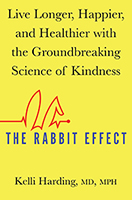The Rabbit Effect: Live Longer, Happier, and Healthier with the Groundbreaking Science of Kindness
ADVERTISEMENT
 Dr. Kelli Harding's new book, The Rabbit Effect, is "an eye-opening and provocative new way to look at our health based on the latest groundbreaking discoveries in the science of compassion, kindness, and human connection."
Dr. Kelli Harding's new book, The Rabbit Effect, is "an eye-opening and provocative new way to look at our health based on the latest groundbreaking discoveries in the science of compassion, kindness, and human connection."
In the book's introduction—"What Are We Missing in Medicine?—Dr. Harding explains how, despite leading the world in biomedical advances and the amount we spend on health care, "Americans can expect to die several years younger than equally well-off individuals around the world."
Wondering how that could be, and what would make us healthier, she followed the tip of a mentor who suggested “You might want to look at the rabbit studies.”
The book's jacket copy explains why:
When Columbia University doctor Kelli Harding began her clinical practice, she never intended to explore the invisible factors behind our health. But then there were the rabbits. In 1978, a seemingly straightforward experiment designed to establish the relationship between high blood cholesterol and heart health in rabbits discovered that kindness—in the form of a particularly nurturing post-doc who pet and spoke to the lab rabbits as she fed them—made the difference between a heart attack and a healthy heart.
As Dr. Kelli Harding reveals in this eye-opening book, the rabbits were just the beginning of a much larger story. Groundbreaking new research shows that love, friendship, community, life’s purpose, and our environment can have a greater impact on our health than anything that happens in the doctor’s office. For instance, chronic loneliness can be as unhealthy as smoking a pack of cigarettes a day; napping regularly can decrease one’s risk of heart disease; and people with purpose are less likely to get sick. Through provocative storytelling and compelling research, Harding presents a new model for you to take charge of your health.
At once paradigm-shifting and empowering, The Rabbit Effect shares a radical new way to think about health, wellness, and how we live.
The excerpt below, from the book's Introduction, offers more.
◊◊◊◊◊
When it comes to our health, we’ve been missing some crucial pieces: hidden factors behind what really makes us healthy. Factors like love, friendship, and dignity. The designs of our neighborhoods, schools, and workplaces. There’s a social dimension to health we’ve completely overlooked in our scramble to find the best and most cutting-edge personalized medical care. Even having something that motivates us to get up and out of bed in the morning makes a difference to our physical well-being.
Because, as it turns out, being and staying healthy isn’t something that can be addressed through biomedical advances alone. Or by more and more spending on health care. Even the usual self-help directives—“Eat better! Work out! Get more sleep!”—will only get us so far. All these approaches overlook the critical social dimensions to ensuring sound minds and bodies. Ultimately, what affects our health in the most meaningful ways has as much to do with how we treat one another, how we live, and how we think about what it means to be human than with anything that happens in the doctor’s office.
This book will empower you to change your health. But not in the usual ways. I won’t give you a ten-step fitness plan or a two-week diet. That’s not what you need. That’s not going to make you healthier in the long run. Instead, I’ll take you with me through the halls of the hospital, invite you into the room with my patients to discover why they are sick and what might make them well. Together, we’ll investigate clinical puzzles that defy expectations, unearthing the hidden factors that determine who is sick and who is well, who will live and who will thrive. We’ll discuss stories from communities renowned for their longevity, and data from studies that turn conventional thinking on its head.
We’ll also explore the surprisingly strong connection between mental and physical health. Together let’s examine how that physiological link, in turn, is aggravated by hidden factors awry in our environment. In other words, to better understand why and how we get sick—and how individuals can boost health—we’ll look at the brain and body in the context of our day-to-day interactions. We’ll then zoom out to an aerial view and look at solutions that boost collective health for all of us. At the end of each chapter there is a tool kit that offers ideas for your own process of self-discovery.
None of this means I’m going to insist you see a therapist. Or try to convince you to take more pills. Instead, we’ll learn to pay attention to how symptoms, such as anxiety or depression or fatigue or pain, may reflect a red flag that something going on in your world needs attention. And how once we’ve addressed our own red flags, we can individually and collectively help others address theirs.
Ultimately, we will come to see how the larger ties that bind us—ties of love, connection, purpose—have ripple effects on our health and the world at large. And throughout the process, we’ll consider fundamental questions about how we live. I’ll ask you to examine your family, your relationships, your community, your neighborhood, your work, and your passions. I’m going to ask you to forget everything you think you know about health and wellness, and together we’ll open our minds to a new paradigm, a new way of thinking about how we live and what it means to thrive.
Excerpted from The Rabbit Effect Live Longer, Happier, and Healthier with the Groundbreaking Science of Kindness.
Published by Atria Books, an imprint of Simon& Schuster Books, Inc.
Copyright 2019 by Kelli Harding.
All rights reserved.
ABOUT THE AUTHOR
Dr. Kelli Harding is an assistant professor of psychiatry at Columbia University Medical Center. She is a diplomat of the American Board of Psychiatry and Neurology, as well as boarded in the specialty of psychosomatic (mind-body) medicine. Kelli works in the emergency room at New York-Presbyterian Hospital, and has appeared on Today, Good Morning America, NPR, The New York Times, Medscape, WFUV’s Cityscape, and US News & World Report.
This giveaway brought to you by Atria, an Imprint of Simon & Schuster. 20 copies are available.




